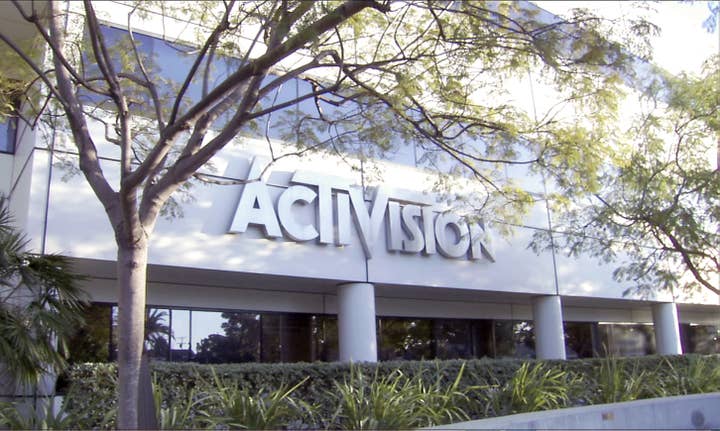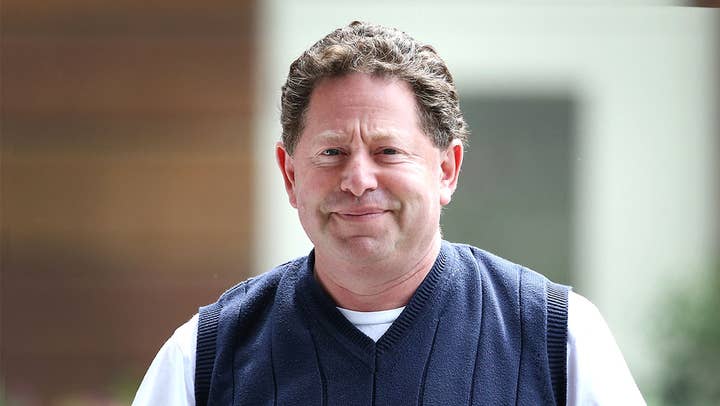SOC Investment Group: Activision Blizzard execs need to be held accountable for toxic working culture
Research director Rich Clayton tells us what more the firm wants from these games giants
In recent years, one organisation has been calling out some of the biggest companies in video games when it comes to executive pay.
Strategic Organizing Center (SOC) Investment Group -- previously Change to Win (CtW) Investment Group -- has been bringing attention to both Activision Blizzard and Electronic Arts over what they perceive as grossly overpaying their management.
This is a campaign in which the organisation has seen some degree of success to date. After calling upon shareholders to not back EA's Say On Pay proposal -- an advisory vote that sees whether investors support how execs at a company will be paid -- in 2020, 68% voted against the plan. That's a pretty stunning defeat.
In 2021, SOC put out a similar letter to shareholders, resulting in just 42% supporting the proposal. That might be marginally greater support than 12 months prior, but the organisation's criticisms of how EA's execs are compensated remain the same; too many potential overlapping awards for execs.

"The major concerns are that EA is paying [their execs] too much and that part of how they've gone about paying too much involves bonuses and other incentive payments that are special in character and not part of the regular order of issuing bonuses," SOC's research director Rich Clayton tells GamesIndustry.biz.
"We want them to get away from this somewhat haphazard pattern and stick to whatever plan that they're going to establish."
In other words, SOC wants EA to have a more concrete schedule of bonuses and awards for its management team, rather than what it sees as a more chaotic plan it has right now. This also extends to the metrics by which exec performance is judged.
"We want to ensure that that plan is not unrealistically tied to the performance of the company," Clayton explains. "And that it's taking into account a full range of different elements of company performance, including issues like their ability to retain employees in terms of other indicators that might tell us whether the company is going to be successful in developing new products in the long run."
SOC might have had some wins when it came to EA executive pay, but that hasn't been the only subject of the investment firm's ire within the games industry. The organisation has also called Activision Blizzard out for how it has "unnecessarily enriched" its CEO, Robert Kotick. In 2020, 43.2% of shareholders voted against the company's Say on Pay proposal, the largest opposition that it had ever received at the time.
For 2021, the publishing giant made what were nominally concessions when it came to Kotick's pay; the CEO's base salary was cut in half, but subsequent awards meant that this reduction was more or less negated. As with EA, SOC says that there are too many bonuses being doled out at Activision Blizzard that overlap and serve to transfer a lot of wealth upwards to Kotick.
When its Say-on-Pay proposal went to a vote in June of this year, things seemingly didn't look too good for the company; so much so that it actually delayed the vote by one week.
"It's both fascinating and distressing. It's the kind of poor governance move that signals it not taking shareholder accountability seriously"
"This was a pretty extraordinary step," Clayton says.
"We're hard-pressed to think of another example of a company delaying a vote by a week because they knew they were losing. I can remember very close shareholder votes on transactions where a company hasn't delayed the vote but has engaged in very heavy lobbying at the 11th hour in order to try to persuade institutions to change their vote. But this was just remarkable."
In a statement to GamesIndustry.biz, an Activision Blizzard spokesperson said: "Shareholders requested additional time to thoroughly review the facts about Activision Blizzard's pay-for-performance compensation."
Even with this seven-day delay, Activision Blizzard only scraped a win, with 54% of shareholders backing its pay proposal. What's even more stunning about the company bumping this vote by a week is that Say-on-Pay is advisory; the firm didn't even need to win to pay Kotick whatever it wanted.
"It's almost strictly a matter of reputation and yet they seem to care enormously, sufficiently to take this extraordinary action in order to try to pull together a majority coalition of their shareholders supporting their past pay practices," Clayton says. "It's both fascinating and distressing. It's the kind of poor governance move that is going to be a clear signal to shareholders that this is not a board of directors that's taking shareholder accountability sufficiently seriously."

Of course, concerns over its executive compensation aren't the only wolves at Activision Blizzard's door right now. In July, California's Department of Fair Employment and Housing filed a lawsuit against the publishing giant in which it alleges that the company fostered a toxic working culture where harassment, bullying and other misconduct were rife.
While Activision Blizzard's initial response to the allegations was questionable, to say the least, the firm has changed tact. In the wake of the news about the lawsuit, Kotick wrote a letter to employees and investors saying that it was going to be both investigating instances of misconduct at the company, as well as reviewing its HR policies.
To do this, it has brought in Wilmer Hale, a law firm that has a history of union-busting and protecting the interests of their wealthy and powerful clients, rather than looking out for workers. This choice was criticised within the industry, while SOC called Activision Blizzard's broad response to the lawsuit "inadequate."
"There has to be some kind of accountability for the highest level executives so that somehow they were not aware of these allegations, despite them being apparently rampant"
"The way that Activision Blizzard chose to go about considering the issues affecting it was to retain a law firm that's really a white shoe defence firm and a former SEC chief enforcement officer [Stephanie Avakian]," Clayton explains.
"As far as I can tell, that individual doesn't have experiences and advocate for survivors of sexual harassment or other forms of abuse. They're not the way that we would recommend going about trying to undertake that kind of consideration."
He continues: "Kotick's letter made pretty clear that the board, on some level, recognises that undertaking some kind of investigation is necessary for the company to rebuild its reputation. But we don't think that the steps that they've taken so far are adequate to produce the right kind of investigation, one that would both enable the company to restore its reputation and make the kinds of changes it's needed."
As a result, in a letter to lead independent director Robert Morgado, SOC has called upon Activision Blizzard to undertake an equity review. This is something that a few publicly traded companies, such as Facebook, Starbucks and Airbnb, have conducted in recent years to really get a sense of the impact corporations have both on their employees but also on the broader culture.
"It really gives a comprehensive view of how a company's structure and operations affect particular communities in the United States," Clayton says.
"A number of these have been civil rights or racial equity reviews where the focus is on understanding how company employment, sales or lending practices -- depending on the kind of company you are looking at -- affect black communities, in particular, communities of colour more broadly, in the US.
"The notion is that there's going to be a much more comprehensive and in-depth consideration of the company's operations, its policies and practices than you would typically have, in response to a shareholder resolution asking for a report from the board on a particular matter. This is a much more serious undertaking, whose objective is to really get at the root of both how the company is operating and whether people from various different backgrounds within the company are being treated equitably. But also understand how the company's products and services are impacting communities out in the world separate from the internal issues of the company."

While Kotick's letter made it clear that the company was open to the possibility of there being a toxic working culture at Activision Blizzard, SOC still feels that there needs to be something of an overhaul of how the corporation works.
"Beyond the admission that certain executives had engaged in harassment, there was not really a recognition of the fact that it's implausible that allegations weren't rising to the top of the organisation," Clayton says.
"There has to be a minimum level of change that we would want to see if a company before we'd want to see them issuing bonuses again. Tying bonus pay to improved diversity and inclusion would be key"
"There has to be some kind of accountability for the highest level executives, either in terms of their own failure to respond to reports of allegations or in terms of the reporting structure, so that somehow they were not aware of these allegations, despite them being apparently rampant."
As a result, SOC says that there needs to be a change to the company's board. Of the ten directors on Activision Blizzard's board, only two -- Reveta Bowers and Dawn Ostroff -- are women. They are also the two most recent appointments, made in 2019 and 2020 respectively. In addition, Bowers is the only non-white member.
Kotick has been on the board for 30 years, while Brian Kelly, Robert Morgado and Robert Corti have been directors for 26, 24 and 18 years respectively. In short, Activision Blizzard's board isn't exactly what you'd call diverse -- and SOC says that this is something that stands to change.
"Adding people from more diverse backgrounds would be helpful, but especially adding individuals who have a track record in terms of advocacy -- such as for people who have suffered abuse -- would really be valuable," Clayton explains.
"It would also be particularly valuable for the company to have an employee director; that way, if it actually the case that the board was unaware of misconduct happening, that could not occur again as there'd be a direct channel of communications between the workforce and the board."
Finally, SOC believes that there should be changes to the way that Activision Blizzard management is compensated. While the firm has been banging the drum against excessive pay for execs for some time now, in this instance the investment group has suggested that execs receive no bonuses for this year due to the "unaddressed problem of sexual harassment" at the firm. In addition, SOC says that in future, bonuses should be contingent on Activision Blizzard meeting certain equality, diversity and inclusion benchmarks.
This is something that French publisher Ubisoft introduced for its execs before similar allegations of widespread misconduct at the company in 2020; it's also a measure that will be shifted away from in favour of carbon reduction goals.
"For Activision Blizzard right now, I think that it's important to have a standard there," Clayton says.
"There has to be a minimum level of change that we would want to see if a company before we'd want to see them issuing bonuses again. Tying bonus pay to achieving some minimum level of improved diversity and inclusion of the company would be key."
Whether this is something that Activision Blizzard would actually introduce willingly is really to be seen in the future. But the fact that the company has seen diminishing support for its executive pay proposals means that it is something of a surer bet than one might assume.
"The company is obviously going to be resistant to doing something like this," Clayton says.
"Even before a big scandal around company culture, Activision Blizzard had a really tough time securing shareholder support for their executive pay approach, so I think there's a basis for believing that investors want to see something different.
"Regardless of how that manifests itself -- the company adopting these changes and then we see what happens on the Say on Pay vote; or maybe there's a shareholder resolution pressing for the company to adopt the change; or maybe this company doesn't adopt the changes and loses on the Say on Pay vote -- I think that one way or another, shareholders are going to be able to communicate support for changes to how executives get paid. I think shareholders are going to communicate support for changes to the company's internal culture."
He concludes: "Activision Blizzard is an example of a company where the case for at least temporarily connecting some measure indicator of workplace culture with the executive pay would be especially strong."
In reply to a GamesIndustry.biz request for comment for this piece, an Activision Blizzard spokesperson said: "We are committed to ensuring Activision Blizzard will become the most welcoming, inclusive workplace in the entertainment industry. There is no place anywhere at our company for discrimination, harassment, or unequal treatment of any kind. Founder CEO Mr. Kotick has delivered outsized returns over the past three decades, including tens of billions of dollars of additional value over the course of his most recent employment agreement."
For the record: This article originally reported in error that Ubisoft tied executive compensation to gender-diversity goals after the misconduct allegations became public. That measure was adopted prior to the misconduct scandal. The article has been corrected.
